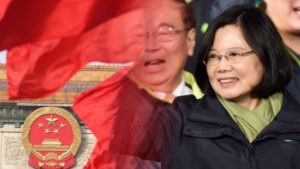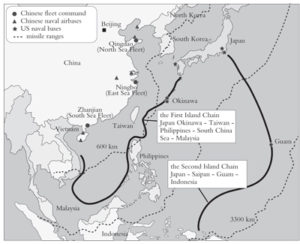
Tensions between Taipei and Beijing have risen again after China announced the decision to suspend the official communications in response to the freshly appointed Tsai Administration’s decision not to embrace the “One-China policy” as reported by An Fengshan, spokesman of China’s Taiwan Affairs. The One China policy refers to the 1992 Consensus reached in the aftermath of the negotiations that took place in Hong Kong in 1992 between the Association for Relations Across the Taiwan Strait (ARATS) and the Straits Exchange Foundation (SEF), stating that “there is one China, with each side having its own interpretation of what that means”.
Since 1992, this principle has remained the most vital cornerstone of Beijing’s policy toward Taiwan, reducing the level of confrontation while establishing a formal framework for the normalization of the relations between the two former enemies. Nevertheless, Chinese Communist leaders have strongly rejected the possibility for Taiwan to declare de jure the independence of the island, adopting the controversial anti-secession law in 2005 and the application of the non-peaceful means in the event of secession or in the case of the failure of the possibilities for a peaceful reunification. Under Deng Xiaoping, the CCP decided to shift from an open hostility, ultimate legacy of the civil war era, toward the promotion of peaceful and fruitful relations.Yet, the military option has never been abandoned and remains an appealing option for Beijing.
Following the rise of the charismatic leadership of President Xi, the discourse on the reunification has embodied a fundamental step towards the path of the Rejuvenation of the Chinese Nation. Therefore, renouncing to Taiwan would represent a fatal strike to the credibility of the CCP and an additional factor of instability in regions where the autonomist movements are often seen as Beijing as a challenge to its authoritarian power.While under Ma Administration, relations with the Chinese Communist Party (CCP) have substantially improved, Beijing has grown wary of President Tsai’s political agenda, clearly not inclined to foster the same level of Taiwan’s engagement in Cross-strait relations of her predecessor. Albeit after her election President Tsai stressed her intention, to not challenge any modification of the status quo, traditionally mistrust over the Democratic Progressive Party (DPP)’s pro-independence represents a serious source of concern for Beijing. The DPP has a long tradition of pro-independence support, whose leadership remains bound by the legacy of the 1999 Resolution of Taiwan that considers Taiwan as a sovereign and independent state.
President Tsai Administration has stressed her willingness to pursue a peaceful and stable development of the Cross-strait relations while setting an ambitious agenda. The unconditional respect for Taiwan’s democracy and values and determination to enhance Taiwan’s role in the region, outside Beijing’s orbit represent a marked turning point compared to the reconciliation policy pursued by the previous administration. In a recent speech for the celebration of the 95th anniversary of the founding of the CCP, President Xi has voiced China’s commitment to reject any attempts to foster Taiwan’s independence cause. In the past, President Xi advanced the idea of granting special legal, economic and political autonomy, following the model of “one country, two systems”. Yet, the proposal was strongly rejected by Ma Administration, even before that Hong Kong became the epicentre of extensive protests against the CCP’s decision to increase its political control.
The CCP has managed to establish positive relations with Ma Administration that culminated with the historical meeting between President Ma and President Xi, last November after nearly seven decades since two CCP and KMT leaders met. Yet, the entente cordiale between Beijing and Taipei promoted by President Ma Ying-jeou has rapidly switched to open and mutual mistrust between the CCP and the Tsai Administration. The CCP considers the DPP as a dangerous catalyst of secessionist tendencies and under Chen Shui-bian Administration (DPP) the issue of independence deeply inflamed the Taiwanese political debate, causing Beijing’s outrage. The return of a DPP pro-independence president surely makes Beijing nervous and willing to wage the threat of military intervention.
In 1996, the CCP tried to influence the elections through military intimidation and the escalation of tensions originated by DPP provocations in the Third Strait Crisis, whose dangerous evolution was prevented by the US naval presence. With the election of a new DPP candidate, Beijing’s military provocations have reached a new peak. In the last months, Beijing has increased the level of pressure on Taiwan, opposing Taiwan activities within the international organizations and boosting the level of military operations across the strait. On May, few days before President Tsai’s presidential inauguration, the 31th Army based in Fujian held military drills on the costs, testing its power projection over the straits while last July, the CCTV showed the footage of PLA military drills, attacking a mock-up of Taiwan presidential palace.
In the last decade, the expansion of ground, air and naval capabilities of PLA reflects Beijing’s determination to enhance its ability to project power and extend its operational capability over the region. Beijing considers of primary importance increasing the level of preparedness in the event of a potential invasion of Taiwan that could virtually be disrupt by the unilateral decision of Taipei to declare the independence of the island.
Washington’s approach to an old dilemma
Albeit Washington has shifted the recognition of China to the PRC in 1979, for over forty years the American government has maintained close relations with Taipei. Through the Taiwan Relations Act, Washington has increased its commitment to the peaceful resolution of the confrontation between Beijing and Taipei, fostering peace and stability in the region and preventing the alteration of the status quo by other than peaceful means.

On the other hand, the expansion of the Chinese military power, the intensifying competition with the US to shape a new regional order coupled with Beijing’s adamant determination to project its power in the region is undermining Washington’s credibility to maintain a preeminent position in the region as a security provider.
Obama Administration’s attempt to encourage Beijing to act as a responsible stakeholder has produced limited results so far and the massive expansion of the Chinese maritime power in the region represents the most evident threat to a large number of the ASEAN nations. Since 2012, when Hu Jintao formulated a new maritime power doctrine, Taiwan has become the pivotal point of the Chinese strategic interest and the main gate to expand its power projection to the South China Sea, currently claimed by Beijing. Chinese leaders consider the reunification of Taiwan to the motherland a strategic goal that could substantially enhance the PLAN presence in the region, far beyond the first island chain and toward the fulfillment of Beijing’s territorial claims over the South China Sea.
This would have seriously affected the regional security architecture supported by Washington and it would increase the sense of insecurity and entanglement of valuable allies such as Japan and Korea, not to mention, frustrating Obama Administration’s attempt to expand the US-ASEAN strategic cooperation in response to Beijing’s land reclamation and infrastructure building projects in the South China Sea.
Therefore, losing Taiwan would be perceived as a direct threat not only to Washington’s strategic interest in the region, but it would also jeopardize the core structure of the American regional security system. The confrontation between Beijing and Taiwan is not an issue that merely affects the cross-strait relations, but it is characterized by wider geo-strategic implications for the region and remains one of the most central points in the Sino-American relations. While in the last few years, Washington has maintained an ambiguous position in the attempt to not alienate Beijing’s leadership and its calls for the development of “A New Type of Great Power Relationship”, the ties with Taiwan have downgraded.
Yet the emergence of a new Administration, less inclined to make concessions to Beijing and increasingly open to enhance the relations with the United States could represent a valuable ally for Washington. In addition, DPP’s decision to foster a more reliant indigenous defense industry, critical to deter any military threat coming from the other side of the strait, shows Taipei’s determination to safeguard its sovereignty and democracy. This new vision promoted by Tsai Administration could turn Taiwan into a vital piece in the US-PRC race for the hegemony in the region, but it could also trigger dangerous confrontation with Beijing, in a region whose security architecture remains dangerously unsteady.